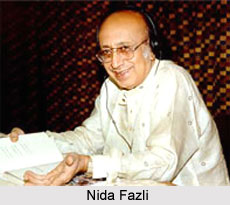 Muqtida Hasan Nida Fazli, a renowned Urdu poet, was born in the year 1938 in Delhi. He was an eminent Urdu poet and a well-known lyricist. Often, his poetry is described as a piece that lacks in any singular identity which defies any neat categorizations. His poetry also mirrors the tartan trajectories of a poet who travelled around the universe. His works specially the Urdu poem, uses both urban and village landscapes to discover nature and relationship between two human beings.
Muqtida Hasan Nida Fazli, a renowned Urdu poet, was born in the year 1938 in Delhi. He was an eminent Urdu poet and a well-known lyricist. Often, his poetry is described as a piece that lacks in any singular identity which defies any neat categorizations. His poetry also mirrors the tartan trajectories of a poet who travelled around the universe. His works specially the Urdu poem, uses both urban and village landscapes to discover nature and relationship between two human beings.
After India gained independence and the events pertaining to Partition of India, the poetic spirit of his work is still out in search of his home and his nation returning to the theme of expecting the impossible unity of the soldiers on opposite sides of the Indo-Pak border. He is an Indian poet who responds to the tragic present of South Asia with a rare sensitivity.
Nida Fazli worked as lyricist in the films and the albums like Razia Sultana (film), Tamanna-``Ghar se masjid hai``, Sur-The melody of life (Film), Is Raat Ki Subah Nahin Aap To Aise Na The, Yatra (Film), Sarfarosh (Film by Aamir Khan starring) and Sur (Aa bhee jaa, ai subha aa bhee jaa).
Nida Fazli has received various awards including Khusro Award, Best Poetry Award from Maharashtra Urdu Academy, Hindi Urdu Sangam Award and Sahitya Akademi Award in the year 1998. In the year 2013, Padma Shri Award was awareded to him by the Government of India.
This article is a stub. You can enrich by adding more information to it. Send your Write Up to content@indianetzone.com













